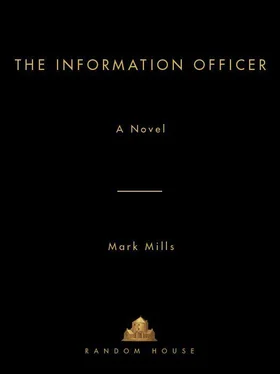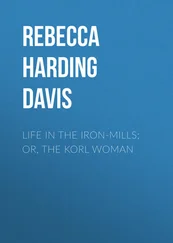Mark Mills - The Information Officer
Здесь есть возможность читать онлайн «Mark Mills - The Information Officer» — ознакомительный отрывок электронной книги совершенно бесплатно, а после прочтения отрывка купить полную версию. В некоторых случаях можно слушать аудио, скачать через торрент в формате fb2 и присутствует краткое содержание. Жанр: Старинная литература, на русском языке. Описание произведения, (предисловие) а так же отзывы посетителей доступны на портале библиотеки ЛибКат.
- Название:The Information Officer
- Автор:
- Жанр:
- Год:неизвестен
- ISBN:нет данных
- Рейтинг книги:5 / 5. Голосов: 1
-
Избранное:Добавить в избранное
- Отзывы:
-
Ваша оценка:
- 100
- 1
- 2
- 3
- 4
- 5
The Information Officer: краткое содержание, описание и аннотация
Предлагаем к чтению аннотацию, описание, краткое содержание или предисловие (зависит от того, что написал сам автор книги «The Information Officer»). Если вы не нашли необходимую информацию о книге — напишите в комментариях, мы постараемся отыскать её.
The Information Officer — читать онлайн ознакомительный отрывок
Ниже представлен текст книги, разбитый по страницам. Система сохранения места последней прочитанной страницы, позволяет с удобством читать онлайн бесплатно книгу «The Information Officer», без необходимости каждый раз заново искать на чём Вы остановились. Поставьте закладку, и сможете в любой момент перейти на страницу, на которой закончили чтение.
Интервал:
Закладка:
DAY FOUR

MAX HAD BEEN HOPELESSLY AWAKE FOR HOURS, WRESTLING with the sheet, when the building wail of the siren cut through his thoughts. The windows were shuttered, but a pale dawn light leaked into the bedroom through the crack in the wall. He’d tracked the progress of this jagged fissure over the past month with a mixture of curiosity and alarm. It had set off on its journey from the floor beside the chest of drawers, traveling in fits and starts on a diagonal path toward the ceiling, widening to a hand’s width as it went. At a certain moment it had disappeared behind the only picture in the room—a naïve watercolor of some unidentifiable fruit in a bowl—only to reemerge a week or so later from behind the shell and coral frame and carry on its way.
There was no stopping it. What it would do when it reached the ceiling was anyone’s guess; structural engineering had never been his forte at college. Diagonal was bad, though; he knew that much. So was the fact that the doors in the apartment no longer closed properly.
His neighbors had long since fled, part of the great exodus that had all but emptied Valetta, Floriana, and the Three Cities, stuffing the surrounding towns and villages to bursting point. His refusal to budge had both puzzled and pleased them; at least someone was left to deter looters. But there was nothing noble and defiant in his decision to remain. From his bedroom window he had a direct view of Mitzi and Lionel’s flat in Valetta, and that kind of proximity was not something he’d been ready to give up. Well, not until now.
Theirs was a third-floor flat, large and light, overlooking Hastings Gardens. Max knew it well. He still had a key to the entrance door downstairs. The key was tucked away in the drawer of his bedside table, redundant for more than two months, ever since Mitzi’s abrupt termination of their relationship.
It had been hard to fault her logic.
“Everyone reaches for a crutch in war. That’s what we’ve done. We’re like two cripples leaning on each other. It can’t continue, Max. I’m a married woman. It has to stop.”
He knew her well enough by then not to argue. She rarely spoke in haste. She had thought the matter through and drawn her conclusion. Nothing he said or did would dissuade her.
“Okay.”
“I knew you’d understand.”
“I didn’t say I understood.”
They had been naked at the time. Five minutes later, he was fully dressed and heading home on foot, sticking to the shadows, as he always did. That’s when he remembered the key in his hip pocket. The black void beyond the bastion wall called out for it, but he kept it clutched tightly in his fist. He had always prided himself on his ability to cope with rejection, and he was happy to be able to ascribe the tears pricking his eyes to the dust carried on the stiff wind whipping through the streets.
His attitude had hardened considerably over the following days and weeks, especially when it became clear there was to be no change of heart on Mitzi’s part. Numb resignation slowly gave way to indignation, then to morose self-absorption.
Tellingly, Lilian was the first to note the change in him.
“What’s wrong?” she had asked as they were winding up one of their weekly meetings. “You’re not yourself.”
“Who of us is?”
She cocked her head at him as if to say, You’ll have to do better than that .
“I mean it. Life here … it’s like another incarnation. I can’t remember who I was.”
“So tell me.”
“What?”
“Tell me. It might help you remember.”
He spoke mostly about architecture, the curious and inexplicable passion that had nibbled at the fringes of his consciousness during childhood, and that he had finally acknowledged, just in time, a week shy of taking up the post he’d been offered by the Foreign Office while still a student at Oxford.
His university friends, taking the first teetering steps in their respective careers, were baffled by his decision to start over from scratch, dismissing it as the whimsy of someone who was an eternal student at heart, which probably wasn’t so far from the truth. His father, on the other hand, had embraced the idea. He’d even embraced Max—something he hadn’t done in years—congratulating him on his courage and offering to cover the cost of a small apartment in London for the duration of his studies.
His time at the Architectural Association had been a revelation, both thrilling and humbling after the dilettante posturing of Oxford, the endless round of dining clubs and debating societies. No one cared if he thought Ezra Pound or T. S. Eliot was the daddy of contemporary poetry. He felt stripped bare, naked, exhilarated. The work came first, their work, not someone else’s. He even learned to find beauty in the tedium of a technical drawing class, the utter silence of people doing rather than discussing. Yes, they talked about architecture—as he did now to Lilian—about its power to make the human spirit soar, and about the green shoots of the exciting new aesthetic pushing through the establishment soil. If he bored her, she didn’t show it.
That one conversation had marked a notable shift in their relationship. She might have been the instigator, but they both played their part in it. Almost imperceptibly, their weekly get-together became a twice-weekly get-together, and he found himself manufacturing further excuses to drop by the offices in Saint Paul’s Street whenever he was in town. The first time he invited her for a drink at the Union Club, it was on some doubtful professional pretext.
Perched on a chair in the ladies’ bar—amusingly nicknamed the snake pit, which didn’t amuse her—she told him the story of her father, a captain in the Yorkshire Light Infantry who had spent a year of his life on Malta, recuperating from injuries sustained in the Salonika campaign. Malta had catered to well over one hundred thousand sick and wounded during the Great War, and had come to be known as “the nurse of the Mediterranean.” Lilian’s mother, like so many other Maltese girls at the time, had been a volunteer nurse, and she’d lost her heart to the lanky Yorkshireman in her care, marrying him a few months before he was sent back to the front. George Flint wasn’t killed by a Bulgar bullet or bomb; he died from malaria in September 1918, a few days before the war in Salonika ended.
Her mother had never remarried, unable to square the concept with her faith, although it hadn’t stopped her from disappearing off to Italy a couple of years before the outbreak of war, on the arm of a visiting professor of archaeology from the University of Padua. This was the reason Lilian now lived with her aunt’s family in Mdina. The invitation to dinner there had followed a few weeks later.
With its walls and ramparts and sweeping views, Mdina reminded him of a number of hilltop towns he had visited in France with his father before the war, and while it lacked a cathedral to match those of Laon or Vézelay, it more than made up for this in other ways. As the seat of the Maltese nobility, its streets and squares were lined with stately palaces, mostly built in a restrained baroque style. The same graceful architecture was evident in the churches, convents, and seminaries that accounted for almost all the other buildings in the compact citadel. The effect was ordered, aristocratic, ecclesiastical; and an ancient peace seemed to hang over the place, a silence broken every so often by the slap and scuff of leather sandals on stone as friars and nuns shuffled about their business.
Lilian’s aunt, her mother’s younger sister, had married into one of the more ancient families, acquiring a convoluted title in the process, although she insisted on being addressed simply as Teresa. Her husband, the twentieth baron of something or other unpronounceable, was an officer in the Royal Malta Artillery. He commanded an antiaircraft battery near the fuel reservoirs at Birzebbuga in the south of the island, and he was rarely around, which left his wife, his niece, and his two young daughters free run of the palace on Bastion Square.
Читать дальшеИнтервал:
Закладка:
Похожие книги на «The Information Officer»
Представляем Вашему вниманию похожие книги на «The Information Officer» списком для выбора. Мы отобрали схожую по названию и смыслу литературу в надежде предоставить читателям больше вариантов отыскать новые, интересные, ещё непрочитанные произведения.
Обсуждение, отзывы о книге «The Information Officer» и просто собственные мнения читателей. Оставьте ваши комментарии, напишите, что Вы думаете о произведении, его смысле или главных героях. Укажите что конкретно понравилось, а что нет, и почему Вы так считаете.










